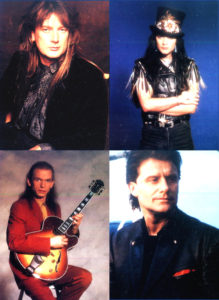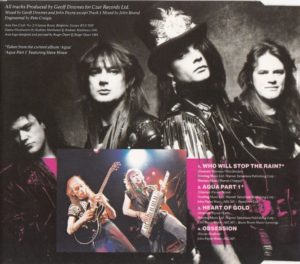Let’s get one thing clear right from the start. Becoming the new lead singer for the band Asia was no glittering prize. Oh, I’m sure it was an honor, but in terms of where the band was at in 1992, you weren’t going to get a lot of anything — except perhaps grief from the diehard fans of the original lineup — for your troubles.
 When the first Asia album landed in 1982, it was a phenomenon. By the time the follow-up Alpha arrived one year later, the band was becoming an afterthought. Lead singer John Wetton was replaced by Greg Lake for the big Asia In Asia concert behind the record. Wetton would return for 1996’s Astra, but guitarist Steve Howe was gone. 1990’s Then & Now was a confusing split — half old songs and half new songs written by people like (yes, that) David Cassidy and The Sex Pistols’ Steve Jones.
When the first Asia album landed in 1982, it was a phenomenon. By the time the follow-up Alpha arrived one year later, the band was becoming an afterthought. Lead singer John Wetton was replaced by Greg Lake for the big Asia In Asia concert behind the record. Wetton would return for 1996’s Astra, but guitarist Steve Howe was gone. 1990’s Then & Now was a confusing split — half old songs and half new songs written by people like (yes, that) David Cassidy and The Sex Pistols’ Steve Jones.
With 1992’s Aqua, John Payne must have realized that change involved more than just his presence on the scene. Steve Howe and Carl Palmer were on-board for the record, sort of. They are part of a complicated array of other musicians, including Al Pitrelli (Savatage, Trans-Siberian Orchestra) and Anthony Glynne on guitars, and Simon Phillips and Nigel Glockler on drums. Who did what and how much of it is, outside of the organization, anyone’s guess. In essence, Asia was becoming more of a mix-and-match with Payne and keyboardist Geoffrey Downes at its center.
This meant that the essential sound of the band was bound to change also. Asia has always been album-oriented rock (AOR) or, as is sometimes termed, melodic rock. The key to Asia’s initial success was the fact that the AOR was being played by high-level prog rock luminaries from bands like Yes, King Crimson, and ELP. The keyboard passages were more orchestrated, the guitar solos more filigreed, and the singing was not exaggerated.
 Traditional AOR vocalists — think David Coverdale or Joe Lynn Turner — peppered their songs with ad libs of the “whoa, whoa; aw yeah; and uh-huh” variety. Where a prog rocker would hit the notes as needed, stay “clean,” and not go too flashy, an AOR singer would punch things up with growls and moans. Neither approach is the wrong approach, provided it works for the attitude of the song. John Payne firmly came from the AOR camp, and so this latest iteration of Asia was bound to be more along the lines of radio-ready hard rock.
Traditional AOR vocalists — think David Coverdale or Joe Lynn Turner — peppered their songs with ad libs of the “whoa, whoa; aw yeah; and uh-huh” variety. Where a prog rocker would hit the notes as needed, stay “clean,” and not go too flashy, an AOR singer would punch things up with growls and moans. Neither approach is the wrong approach, provided it works for the attitude of the song. John Payne firmly came from the AOR camp, and so this latest iteration of Asia was bound to be more along the lines of radio-ready hard rock.
Only, it wasn’t. Payne got in about five years too late, and the alternative rock onslaught, fueled more by punk rock than “cock-rock,” was already taking a toll on the hair metallers who were caught completely blindsided. Witness the booklet for the CD Aqua, and there’s the picture of Payne with long hair, eyeliner, and a feathered tophat, looking like flashback from the mind of John David Kalodner John David Kalodner. The odds, as they say, were against him.
But Payne was there for five albums; seven if you include the two Archiva odds-and-ends records. He dealt with the years of being on tiny, niche independent labels that frequently used the Comic Sans font in the art design. He rolled with the unending changes of people coming in and going out, with only he and Downes as the constant, and in more ways than one, helped keep the band alive until Downes reunited the original lineup for 2008’s Phoenix.
Separated by time, change, and the sad passing of John Wetton, here is an opportunity to assess what Payne provided and how he did. This series will look at the five committed studio albums: Aqua, Aria, Arena, Aura, and Silent Nation, and will attempt to judge them against each other in as fair an environment as possible. It is impossible to completely exclude the influence of the John Wetton years, but we hope this examination places the Payne albums back in their proper place in the history of the band; not as a time-loss anomaly, as some categorize them.
As producer and, I assume, the person in the position of sequencing the CD, Geoff Downes knew what he was doing. The opening track “Aqua 1” is an instrumental and puts Steve Howe front and center. It makes great sense that, by reuniting Howe in the Asia context, and by putting him at the top of the running order, you are bound to create a sense of goodwill and continuity for the listener. That care is continued in the second track, and the first to introduce new singer John Payne, “Who Will Stop The Rain.”
The first vocal portion of the song features what I will refer to, from time to time, as “The Asia Stack.” This is a dense vocal harmony piece, often with a fair amount of reverb on it. It’s the sound you’ll remember from the choruses of “Heat of the Moment” and “Only Time Will Tell.” Again, it makes a lot of sense that this is your first exposure to John Payne. Overall, the song is pretty good and quite memorable, especially that chorus with the Asia Stack. But Payne attacks the first verse with such over-the-top bravado, you tend to forget what came just before. In the context of this album, the song works well and is memorable. It’s a good start. I wish Payne had shown a bit more restraint, but there are other moments on the album that make this look passive.
“Someday,” “Don’t Call Me,” two Greg Lake co-writes in “Love Under Fire” and “The Voice of Reason,” and even “Heaven On Earth” tangle with the possibility of oversinging (even in the tender, passionate parts that sound overwrought), but still manage to entertain and be strong contenders for memorable melodic rock. “A Far Cry,” which begins with a complex Downes keyboard passage, identifies itself as one of the best on the album — certainly one of the most “Asia-like.”
“Crime of the Heart” is handicapped by being not only vocally melodramatic and bogged down by clunky lyrics, but by being a power ballad. That said, there aren’t many power ballads in and around this time that weren’t burnt up lyric grenades. Remember: this album was only one year away from the return of Meat Loaf and Jim Steinman’s “I Would Do Anything For Love,” which makes my point. “Crime of the Heart” fails mostly for being too faithful to the form.
There is one dead-on-arrival clunker on Aqua, and while one track on a CD of twelve should not threaten to bring the whole thing down, “Back In Town” nearly does. With lines like “Wheels turn, smoke rise, chrome wings, low ride…concrete, touch sky, main street, dogs lie” and a face-palmer chorus of “The bad boy’s back, the bad boy’s back in town…don’t you shoot him down,” we’ve hopscotched straight past Sylvester Stallone movie theme song territory straight into the Lorenzo Lamas direct-to-video song square. What assuredly was meant to project cool swagger and take-no-crap Roadhouse attitude just sinks straight to the bottom. Many of these ideas were bad even when they were at their usage-apex in the ’80s. By 1992, the fact they were being applied, and by a band that in previous years had at least a pretense of sophistication, was embarrassing enough. It’s just a really awful song.
Why is it here? My uneducated guess would be that compact discs were nearly 80 minutes long, studio time was expensive, and so you put out everything you recorded, even if the final product would be better with fewer but stronger songs. This is one of the reasons why, eventually, people turned away from CDs. Too much real estate to build on and not enough quality control.
The greatest sin that Aqua commits is that — at its core — it is a mid-Eighties album pulling into dock nearly a decade too late, but still manages to have a few memorable tracks. I suspect that if one interviews Payne today, he’d agree and would certainly opt for 30% less gusto to let the songs breathe. None of the tracks here are going to make people immediately forget the debut album or Alpha, and that’s just the way it is, but as an example of commercial electric rock, there’s a lot to like about Aqua.
Best tracks: “Who Will Stop The Rain,” “A Far Cry,” and “The Voice of Reason”
Worst tracks: “Back In Town,” “Crime of the Heart”
Overall analysis: Just because you can (fill an entire disc) doesn’t mean you should. Had some of the songs on Aqua been held back, the resulting release would have been shorter but stronger.
Next time, Asia sings an Aria.





Comments